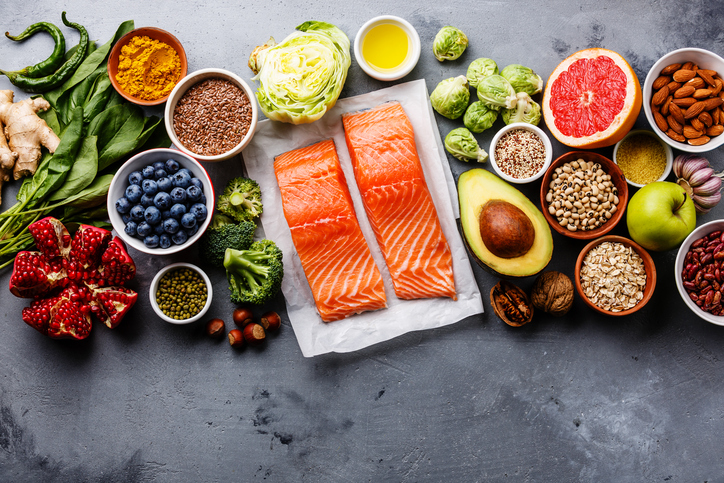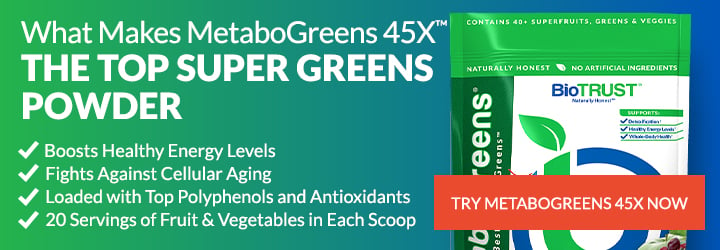The Top 10 Foods That Fight Allergies Naturally

Outside my office in the foothills of the Rocky Mountains in Colorado, the tulips and daffodils are in full bloom (along with the dandelions). And there’s another plant, mostly likely a weed, with small purple flowers that always smells like spring to me. (I LOVE that smell!) Even the crabapple trees and lilacs are starting to show hints of color. Unfortunately, the rainbow of beautiful spring colors also comes with a lot of “gesundheits.” Yes, allergy season strikes again.
If you’re one of the 20% of adults in the U.S. who suffers from seasonal allergies (also known as Allergic rhinitis or hay fever), then you’re well aware of the symptoms. These include stuffy nose, sneezing, watery eyes, and itchy nose, eyes, and even the roof your mouth. And you’re certainly not alone. Allergies are the 6th leading cause of chronic illness in the U.S. And with an annual cost over $18 billion, it’s obvious that we’re not afraid to pay to end our suffering.
Medication (e.g., antihistamines) and immunotherapy (e.g., allergy shots) are perhaps the most prominent ways to fight the symptoms of allergies. Yet surprisingly, foods might also help our bodies better deal with the onslaught of pollen from trees, grasses, flowers, weeds, and mold spores. While no foods are proven “cures,” here are 10 foods that fight allergies to help you survive this allergy season by helping equip your body with the tools it needs to support a healthy immune response:
10 Foods that Fight Allergies
1) Fatty fish, such as salmon, sardines, tuna, and mackerel are rich in omega-3 fatty acids, which have numerous beneficial effects including the ability to support the body’s healthy response to inflammation. In addition, they may suppress an overactive immune response, which is associated with allergies. Finally, they may help support lung function and relieve coughing, sneezing, and runny noses. Try to eat omega-3 rich fatty fish twice weekly.
2) Quercetin-rich fruits and vegetables, such as cabbage, onions, garlic, peppers, berries, apples, and parsley, are high on the list because quercetin helps repress the histamine response to allergens. This nutrient also helps calm inflammation.
3) Citrus fruits, like oranges, grapefruit, lemons, and limes are rich in vitamin C, another nutrient that helps lower the histamine reaction. Plus, it’s well known that vitamin C supports the immune system as an effective antioxidant and key nutrient for immune cells. Other excellent sources of C include kiwifruit and bell peppers.
4) Greek yogurt supplies a healthy dose of probiotics, which also support a healthy immune system. As one study in the American Journal of Clinical Nutrition demonstrated, when researchers provided 173 allergy sufferers with probiotics for eight weeks, they experienced 68% fewer symptoms than given a placebo (who reported a 19% improvement). Other sources of probiotics include kefir, sauerkraut, and miso.
5) Turmeric…after all, what isn’t turmeric good for? This Indian spice known for its golden color and ability to yield delicious curries has been shown to help support the body’s inflammatory response, and it also provides powerful antioxidant and anti-inflammatory properties. The active ingredient in turmeric, curcumin, also appears to help prevent the release of histamines and may help clear excess mucus from the sinuses (making it one of the top foods that fight allergies). Rumor has it that Golden Milk can be quite helpful on days when the pollen counts are climbing.
6) Elderberries, another rich source of quercetin as well as vitamin C, are considered another potential food to fight allergies as they support the immune system and help suppress the histamine response. In fact, these berries have a long history of medicinal use. Don’t just run out and start eating the berries fresh off elder trees, though. They need to be cooked before they’re edible, which is why they’re typically found in pies and, more commonly, syrups.
7) Flaxseeds, which are known for their omega-3 fatty acids, are also a terrific source of selenium. This mineral appears to help protect cell membranes, support the immune system, and may even increase antibody response. In addition, selenium helps support the activity of vitamin C. So, throw a spoonful of ground (not whole) flaxseeds in your next smoothie as another one of the foods that fight allergies.
8) Cruciferous vegetables, such as broccoli, broccoli sprouts, kale, Brussels sprouts, bok choy, and collard greens, are also high in the allergy-fighting vitamin C. In addition, they may help clear blocked sinuses so you can breathe easier. They also provide carotenoids (such as beta-carotene, lutein, and zeaxanthin), which are antioxidants that may help defend against allergies.
9) Local honey in the raw is believed (by some more than others) to help fight allergies by exposing you to small amounts of pollen from plants in your area. The thought is that, over time, your body can acclimate and therefore produce less of an allergic reaction when the pollen counts skyrocket. It’s a similar rationale as homeopathy and, to some degree, immunotherapy (e.g., allergy shots). There are two caveats though. First, for it to be effective, it appears you need to consume it regularly throughout the year. And second, the bees need to gather pollen from the plants that cause your allergies. Yet, bees go toward flowers, and typically, it’s the pollen from weeds, trees, and grasses that are the worst allergy culprits—not flowers. So, this food may be more effective for some people than others.
10) Chocolate, believe it or not, may be on the foods that fight allergies. Even though there’s only a small 2012 animal study that shows such benefits, it reported that cocoa may reduce production of IgE (an antibody associated with an allergic response), suggesting the cacao flavonoids helped prevent allergies. Always willing to enjoy a square of quality dark chocolate, that’s good enough for me.
Foods That Fight Allergies: A Recap
While these foods may not be able to cure allergy symptoms, anyone who has suffered the burning, itching eyes, runny nose, and other uncomfortable symptoms of allergies can appreciate even a small amount of relief. And these foods all appear to help fight allergies, so you can better enjoy the blooms of spring and summer—instead of wishing for winter. While the foods that fight allergies are ones you’ll want to include more of in your diet, there other foods that may make symptoms worse. To avoid making symptoms worse, it’s a good idea to avoid excess sugar, refined vegetable oils, highly processed foods, and excess alcohol, especially when pollen counts are high.







